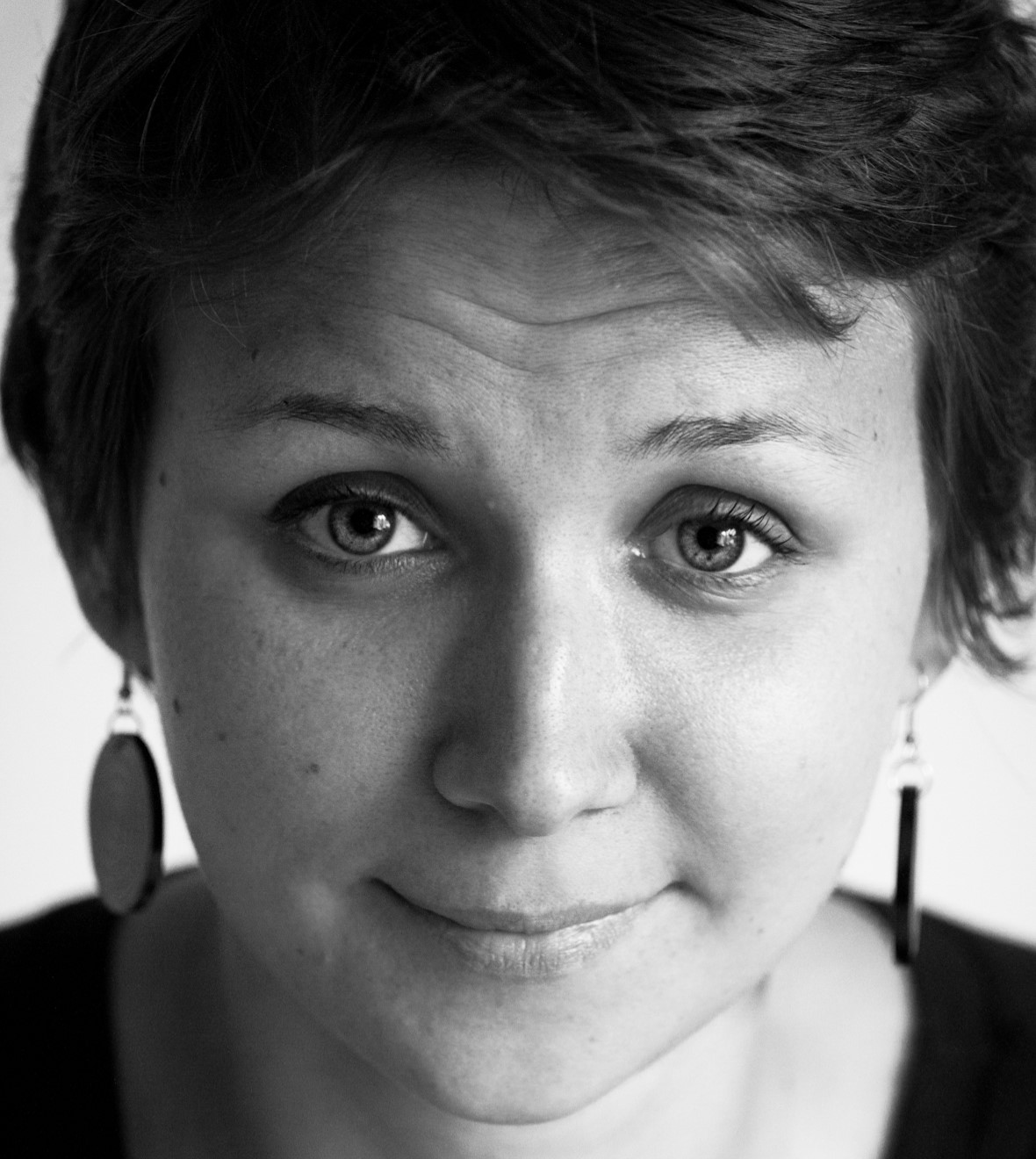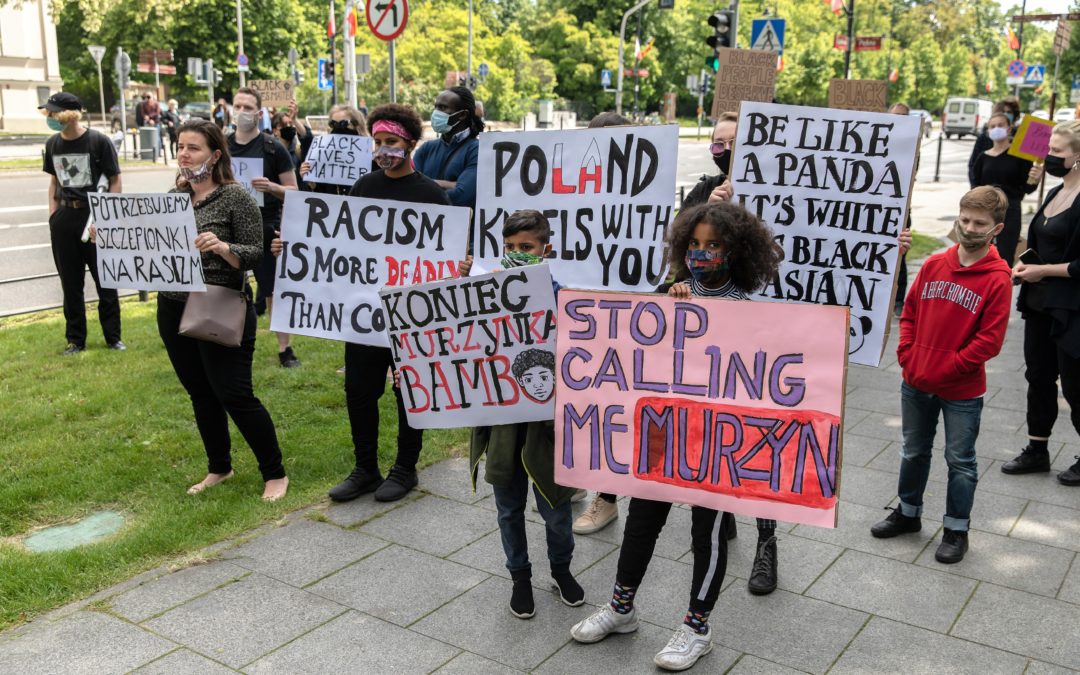The ongoing Black Lives Matter protests, sparked by the killing of George Floyd, have spread beyond the borders of the United States, including to Poland. During one demonstration outside the US embassy in Warsaw, a student was pictured holding a sign saying “Stop calling me Murzyn”, with the image being shared widely on social media.
Her words revived a debate over language in Poland. The term “Murzyn” (which has the same etymological roots as the English “Moor”) has long been used to refer to a black person. Many, however, argue that it is outdated and offensive (like the English “Negro”). But others insist the word is neutral and acceptable.
Notes from Poland has asked a range of figures to give their views on the word “Murzyn”. Below we present the opinion of linguists, a historian, an anti-discrimination trainer, a columnist and members of the black community in Poland, including the father of the girl pictured at the Warsaw protest. (Tekst dostępny jest również w języku polskim.)
Warszawa 04.06.2020 “Stop calling me murzyn (negro)”
Opublikowany przez Rafała Milacha Czwartek, 4 czerwca 2020
“How could that word ever become neutral for me?”
Arinze Nwolisa, vice-chairman of the Porta Foundation, which holds workshops on tolerance in schools, and father of the girl with the placard
Many Poles tell me that it’s a normal Polish word and not offensive. But none of these people has any idea what it’s like to be a black person, so how can they tell me how to feel?
Seventeen years ago, I had my arm broken in the centre of Warsaw. Four Poles attacked me, shouting “F**k the Murzyn”, “Go back to Africa”. I understand perfectly well what that means now, but then I had no idea what they were talking about. And I’ll never forget it. How could that word ever become neutral for me?
For 17 years, since I came to Poland, I’ve been hearing comments like “Where did a Murzyn get the cash for a nice car?”. Sometimes I go into a restaurant and people start to joke that a Murzyn’s come in. I stopped taking my children to the zoo because I’ll never forget when I went to look at the chimpanzees with my children and I heard someone making jokes that “the monkey brother” had arrived. It’s not fair, it’s not funny. But people talk like that.
If I started calling every Pole I meet “whitey” there’d be uproar straightaway. But when people say “Murzyn” or “czarnuch” [a term equivalent to “n****r”] to black people everything’s all right. Everybody has a name. If you don’t know me, call me “Pan” [“Sir”, the Polish formal term of address]; if you know me, use my name.
What hurts me the most is that my children are now going through the same. My daughter, who is in the photo with the placard, also has this kind of experience from school that someone calls her “Murzyn” or “Murzynek”. My children don’t want to go to school then; it’s not right. And the teachers don’t react.
So I ask people to stop saying “Murzynek Bambo” [the name of a traditional children’s poem], “czarnuch”, “czarny” [black]. “Ciemnoskóry” [dark-skinned] is OK. That’s why we started doing workshops for children in schools. Because how should a two- or three-year-old know what “Murzynek” means? It’s the parents who should teach their children that people are different – some have “white” skin, others “dark”, and that’s it.
“The troublesome M-word”
Jadwiga Linde-Usiekniewicz, professor of linguistics and co-author of “Recommendations Concerning Non-Discriminatory Language”
For decades, black people living in Poland, mainly immigrants from African countries but also their descendants born in Poland, have been calling public attention to the fact that they find the M-word offensive. They also state that figurative meanings and idioms featuring the m-word (usually spelled without capitalisation) strengthen the negative connotations of the term and reinforce negative stereotypes about black people.
Many Polish speakers, concerned with good communication practices and non-discriminatory linguistic usage, now tend to avoid the M-word. For some of them, and even more so for those belonging to older generations, like me, this change was not effortless. For decades the M-word was not considered offensive. In addition, since it does not allude to skin colour (as it derives from “Moor”), it was perceived as an ethno-cultural term.
By contrast, words referring to colour, such as czarny (black), were judged racist. This entrenched usage of the M-word is reflected in Polish dictionaries, where it bears no cautionary register or style label. This view is also held by some prominent Polish linguists.
Yet the argument that the M-word is an ethno-cultural term is spurious. The perception of black people as pertaining to a single ethnic or cultural community is strongly rooted in an implicit post-colonial perspective. Therefore I tend to agree with Marek Łaziński [a Polish linguist], who in the article “More on the word Murzyn and stereotypes” said that “the word ought to promptly disappear from public discourse”. I would also add that it is best avoided in private conversation as well, even when there are no Polish-speaking black people in the audience.
Which word should replace it? If it is necessary to mention a person’s skin colour, the safest term is osoby czarnoskóre (black-skinned people). Afroamerykanie (Afro-
When referring to black men and women who are Poles, the best solution seems to be Afropolacy and Afropolki (Afro-Poles, in male and female form) even though the words are not yet registered in most Polish dictionaries. However, afro– is registered as a prefix of compound words which refers to Africa, and a spelling dictionary also features Afroeuropejczyk (
“Alternatives? We don’t need such words at all”
Małgorzata Sójka, educator and anti-discrimination trainer from Warsaw Multicultural Centre
The simplest way to avoid excluding or offending someone by the way we refer to them is to pay attention to voices from the group that is affected. The term “murzyn” is not only archaic and unsuited to contemporary language, but also pejorative: [the common sayings] “a hundred years behind the murzyns” (meaning being very backward) and “doing the murzyn’s work” (doing someone’s dirty work) are examples that show how this word functions in Polish.
We are yet to find anyone among our black colleagues, friends and beneficiaries who is not bothered by this word and considers it neutral. As for alternatives, we seriously doubt the need to use them at all. When we talk about someone, do we really need to define the colour of their skin? Is it not easier to say “the neighbour from number 14” than “the black person from the second floor”? If we want to refer to a white person whose name we do not know, do we mention the colour of their skin? No.
So why do we find it so easy to do so when referring to a person whose skin is not white? If we need to describe someone, let’s use neutral and truly distinctive individual characteristics.
“I will go on using this word”
Łukasz Warzecha, columnist for the Do Rzeczy news weekly
The key question in this discussion is whether one can and may direct language on a top-down basis. In my view, one cannot, and it should not be permitted. This attempt by a certain body to decide whether this or that word is improper is in fact an attempt to direct reality through language. This is in fact what political correctness means, and I absolutely do not accept this. If a word is commonly used and does not disappear of its own accord, people are fully within their rights to use it.
I do not accept the linguistic, and hence also ideological, terror of certain small groups that believe they have the right to decree which words we should and should not use. Following this logic, any group could prohibit us from using any given word because they did not approve. Yet words have objective overtones and connotations. The fact that a certain group says that a certain word offends them does not mean that it is objectively offensive, and it should not be important.
The word “Murzyn” never had a negative connotation in Poland simply because we never had slavery in its classical form. The oft-cited serfdom and feudalism were something different. We never had slavery of black people, so the word “Murzyn” was not connected to slavery in Poland. It derives from the word “Maur”, which is also neutral, the best example being Polish Romantic poetry, especially Mickiewicz.
Some people think that the idioms [incorporating the word “Murzyn”] that exist are offensive, but in many different sayings describing negative phenomena various words are used, including those referring to groups of people, and nobody should claim that we have to change all these words now.
Regarding “Murzyn”, some of these sayings are wrongly interpreted negatively. For example, there is nothing contemptuous about the phrase “Murzyn zrobił swoje, Murzyn może odejść” [literally: “the Murzyn has done his job, the Murzyn can leave”; figuratively: “once you’ve served your purpose, you’re no longer needed”]. On the contrary, it signifies feeling sorry for somebody whom we dispense with when they have done the dirty work. “Murzyn” in this saying means a person who has been exploited and deserves compassion and care.
I don’t use the word “African American”, because many black Americans had nothing to do with Africa. Not to mention the fact that it would be ridiculous to use this word to describe black Africans or black people from other parts of the world. When writing and speaking, I use the word “Murzyn”, and I will go on doing so.
“We do not have natural words that fit”
Jerzy Bralczyk, professor of linguistics specialising in the language of media, advertising and politics
We should not use expressions that the people in question might regard as offensive. I personally did not see anything wrong with the word “Murzyn”. This word has certain traditions in Poland and has been in use for a very long time, also metaphorically, appearing in various contexts. But if dark-skinned people have something against it, I would never use this word towards them.
I remember a conversation with a close friend about whether people could call him “Murzyn”. I said yes, because he was a “Murzyn” after all. But the result of the conversation was that he took offence and is no longer my close friend.
The word itself in Polish also had negative connotations, but in general it meant a dark-skinned or black-skinned person. We do not have natural words that fit here and that we can use without additional connotations.
So I would not use this word publicly and to refer to specific people, but in my view it is not an offensive word, and perhaps if we used it more often in a positive or neutral sense it would lose its negative associations.
For my generation, this word was mainly neutral, although there are disdainful expressions such as “we are many years behind the murzyns”. Therefore, for the sake of political correctness it is better not to use this word, which might bother someone.
In the past, Poland did not have too many dark-skinned citizens, and we didn’t encounter them so often, so I guess there was also no one who might feel offended, but the situation has changed, which is why it should be taken into account in our dictionary.
“The word can be defended from a historical perspective”
Łukasz Jasina, historian
It seems important in this situation to differentiate two discourses. Firstly, each of us has every right to say that something is hurtful, racist, unfair. This need not be based on any justification or historical knowledge. For example, as a gay man, I might feel offended by certain terms or ways of acting, but that does not mean that objectively I can feel offended by everything.
On the other hand, though, society must extract some general rules, and cannot always match everything 100% to what every citizen wants to do. Courts need to have a basis for ruling on whether something is regarded as racism or not, the state authorities should create objective documents in this regard.
In the case of the word “Murzyn”, we have the chance to build on a certain form of historical thinking, looking at what was in Poland a form of racist description of people with darker skin.
One of the protesters at the US embassy wrote that for him, the word “Murzyn” is racist owing to its associations with the word “Negro” in English. For him, “czarny” [black] is not so tinged. In Poland, though – and I say this both from my own experience and analysing literature – it is rather the word “czarny” and the derivative word “czarnuch” or other terms for colour of skin that were usually racist terms, whereas “Murzyn” was simply a description of a person with black skin inhabiting Sub-Saharan Africa, and was rather analogous to the word “European” or “Asian”.
Except that this puts us in something of a deadlock: some regard it as acceptable, and others not. It’s rather like with feminine noun endings. There are women who insist that I should not use feminine endings, and should call them “Pani Profesor” [Madame Professor] or “Pani Marszałek” [Madame Speaker]. In private conversations, everyone should adapt to their friends to avoid offending anyone. But I don’t see any reason to start a discussion on removing this word from discourse altogether.
The question is to what extent in Poland we are able to have a discussion while searching for a broad consensus without imposing views. What we have now is one side or the other imposing their words and rules, and in such a violent world, sooner or later that always encounters vociferous resistance and protest from the other side.
However, it is worth emphasising that the word “Murzyn” can be defended from a historical perspective. Let’s remember that the English or German words for Slavs are very similar to the word “slave”. If we start to question this, we will begin a discussion that could overturn the entire global discourse. It’s certainly worth talking about it, but we should not forget that language is a material that must be accepted by everyone or almost everyone.
“My husband couldn’t stand the racism and left Poland”
Maria, member of the black community in Poland (whose name has been changed at her request)
My daughter looks exactly like the girl in the photo. When she was eight, she started to ask questions like “why are the brown people in most films criminals and gangsters, or evil? Why don’t they play the leading roles?” In the end she asked about “Murzyn”. I explained what it means and how it is used in Poland. But she didn’t accept it.
At school if someone calls her that she opposes it immediately and explains, “Don’t call me that, I have a name. Besides, you don’t say ‘murzyn’, because ‘murzyn’ means ‘slave’!” She’ll cope until someone attacks her physically.
My son is eight now. He went on a football camp. His group was playing with an older year group. And the older ones called him “murzyn”. My son was dismayed. His friend backed him up, saying, “he has a name and isn’t a murzyn”.
My children don’t say “czarnoskóry” [black-skinned], they always ask where someone is from: Ethiopia, the USA, Mali etc. If they don’t know, they say, “the brown one”. When my son invites friends for his birthday, he says, “I’ll invite white Franek [a Polish boy’s name] and brown Franek. They say what they see. They have no need for the word “murzyn”. Let’s listen to children.
My husband couldn’t stand the racism, and left Poland. Every day he’d hear racist comments, there were taunts on the street, monkey noises, people called him czarnuch [n****r], or wanted to pick a fight.
Translated from Polish by Ben Koschalka
Main image credit: Jędrzej Nowicki/Agencja Gazeta

Agnieszka Wądołowska is deputy editor of Notes from Poland. She has previously worked for Gazeta.pl and Tokfm.pl and contributed to Gazeta Wyborcza, Wysokie Obcasy, Duży Format, Midrasz and Kultura Liberalna



















